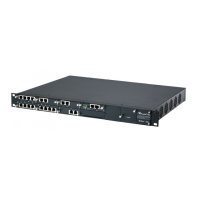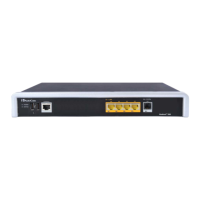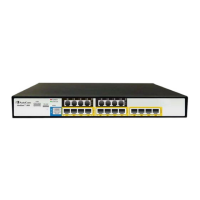Version 6.4 273 March 2012
SIP User's Manual 18. GW and IP to IP
In addition to basic outbound IP routing, supports the following features:
Least cost routing (LCR): If the LCR feature is enabled, the device searches the
routing table for matching routing rules and then selects the one with the lowest call
cost. The call cost of the routing rule is done by assigning it a Cost Group. For
configuring Cost Groups, see 'Least Cost Routing' on page 182. If two routing rules
have identical costs, then the rule appearing higher up in the table (i.e., first-matched
rule) is used. If a selected route is unavailable, the device uses the next least-cost
routing rule. However, even if a matched rule is not assigned a Cost Group, the device
can select it as the preferred route over other matched routing rules with Cost Groups,
according to the settings of the LCR parameter, LCRDefaultCost (see 'Enabling the
LCR Feature' on page 185).
Call forking: If the Tel-to-IP Call Forking feature is enabled, the device can send a Tel
call to multiple IP destinations. An incoming Tel call with multiple matched routing
rules (e.g., all with the same source prefix numbers) can be sent (forked) to multiple IP
destinations if the rules are defined with a Forking Group in the table. The call is
established with the first IP destination that answers the call.
Call Restriction: Rejects calls whose routing rule is associated with the destination IP
address of 0.0.0.0.
Always Use Routing Table feature: Even if a proxy server is used, the SIP Request-
URI host name in the sent INVITE message is obtained from this table. Using this
feature, you can assign a different SIP URI host name for different called and/or
calling numbers. This feature is enabled using the AlwaysUseRouteTable parameter.
Assign IP Profiles: IP Profiles can be assigned to destination addresses (also when
a proxy is used).
Alternative Routing (when a proxy isn't used): An alternative IP destination can be
configured for a specific call. To associate an alternative IP address to a called
telephone number prefix, assign it with an additional entry (with a different IP
address), or use an FQDN that resolves into two IP addresses. For more information
on alternative routing, see "Alternative Routing for Tel-to-IP Calls" on page 283.
Notes:
• Outbound IP routing can be performed before or after number
manipulation. This is configured using the RouteModeTel2IP parameter,
as described below.
• You can also configure this table using the ini file table parameter Prefix
(see 'Number Manipulation Parameters' on page 750).

